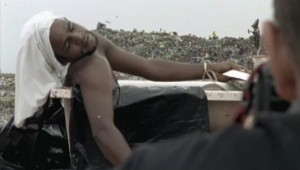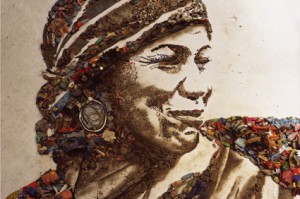
Picker and union leader Tiao recreates “The Death of Marat,” with a tub recovered from the landfill.
Although it’s not in the class of Agnes Varda’s great 2000 documentary, The Gleaners & I, Lucy Walker’s look at life in the landfills of Rio de Janeiro has some illuminating points to make about forgotten people who make their way by recycling society’s detritus. Although it resolutely aspires to be a feelgood film, Waste Land is surprisingly thornier and more bothersome than Varda’s modern classic.
Even though successful New York-based artist Vik Muniz grew up in a low-income Brazilian community, he doesn’t expect to find a genteel sort of people when he resigns to spend a couple of years photographing pickers who live and work in Jardim Gramach, the largest landfill in the world, which is located on the outskirts of Rio. Because of gang wars in favelas nearby, the trash heap is known to be a dumping ground for dead bodies as well as the plastic that the pickers turn in for pennies on the pound.
 It comes as some surprise to the artist then that the workers are often quite profound. Some of them collect discarded books from the trash heaps in the hopes of starting free libraries in their poor neighborhoods and are able to quote Machiavelli, Marat and Nietzsche. He probably didn’t expect to find so many workers who could speak so eloquently to the environmental benefits of their drudgery. And he likely didn’t think he would meet a picker like Tiao, a determined young man who formed a union of landfill workers even though his own family told him it was folly. As a whole, the pickers claim to be happy with their work, even as they live in rat-filled shacks and eat food they find in the garbage. They are dignified, they are proud, they are resolute.
It comes as some surprise to the artist then that the workers are often quite profound. Some of them collect discarded books from the trash heaps in the hopes of starting free libraries in their poor neighborhoods and are able to quote Machiavelli, Marat and Nietzsche. He probably didn’t expect to find so many workers who could speak so eloquently to the environmental benefits of their drudgery. And he likely didn’t think he would meet a picker like Tiao, a determined young man who formed a union of landfill workers even though his own family told him it was folly. As a whole, the pickers claim to be happy with their work, even as they live in rat-filled shacks and eat food they find in the garbage. They are dignified, they are proud, they are resolute.
They are not completely honest, however, even with themselves. When a group of pickers is hired to work with Muniz for two weeks in his temporary studio in Brazil, helping him reproduce their photographs in large-scale sculptures with the aid of trash and recyclables, most of them quickly realize that they never want to go back to Jardim Gramach. After such beauty, how can they return to the refuse? It’s easy to be amazed by these workers, their industry and ingenuity, but no one should make the mistake of idealizing them or a life that is clearly damaging to body and soul. As Joan Didion wrote, “We tell ourselves stories in order to live.” Sometimes those stories are laced with a self-deception necessary for survival.•
